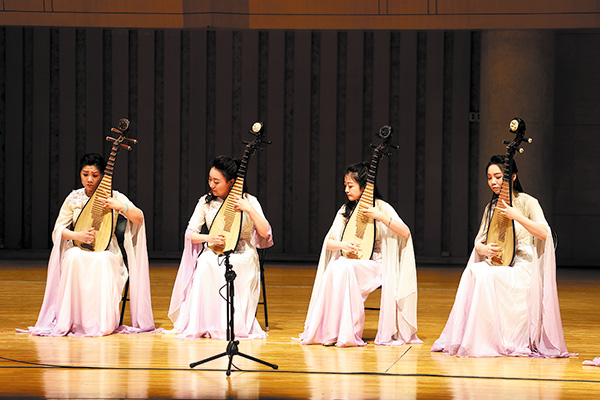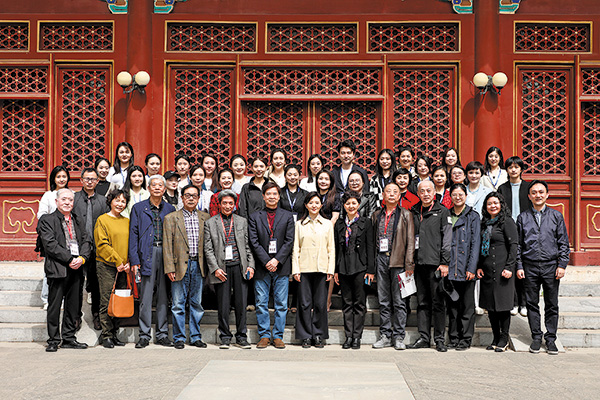Strings of opportunity
By Xing Wen | China Daily | Updated: 2023-06-03 10:10
Within the Forbidden City Concert Hall in Beijing, the sound of pipa (a four-stringed lute) alternates between commanding grandeur and delicate elegance, resonating with the listeners present.
Beyond the walls, amid the lush greenery of a vibrant early summer forest, the melodies intertwine with the rustling leaves, creating a harmonious symphony of nature and music.
The recent concert showcased the results of a training session to promote the Pinghu style of pipa playing among a younger generation of musicians.
Throughout the long course of history, China's pipa playing has given rise to four prominent styles, namely, Pinghu, Pudong, Chongming and Wang, according to Zhang Hongyan, director of the Traditional Chinese Instruments Department at the Central Conservatory of Music.
Presently, the styles of Pudong, Chongming and Wang are passed down as essential components of the music curriculum in academic institutions. However, the Pinghu school, an important style of pipa performance, is currently grappling with the challenge of having insufficient successors to uphold its esteemed heritage.

The training session, sponsored by Beijing Culture and Arts Fund, invited established pipa players and composers to instruct a group of young musicians and music teachers in the Pinghu style.
"The training session focused on promoting the Pinghu style of pipa playing among teachers, who we selected from esteemed universities across the country," says Zhang, also the initiator of the training session.
She notes that it is only by integrating the time-honored pipa-playing style into the teaching systems of these academic institutions can the Pinghu style's legacy be truly promoted and elevated.
Around two decades ago, Zhang, who learned to play the pipa as a child, harbored a question. "Given the significance of the Pinghu style, from whom should I learn it?"
Fortunately, several years ago, Zhang heard about pipa player Li Jianzheng, who was the senior disciple of Yang Shaoyi (1913-74), the seventh-generation successor of the Pinghu style. Determined, Zhang decided to pay Li, who lives in Xi'an, Shaanxi province, a visit.
"Li offered his heartfelt welcome to me, saying 'I have been eagerly awaiting your arrival', which truly touched me," Zhang recalls.
She assisted Li in publishing a musical score, which is a compilation of traditional Pinghu-style pipa music taught by Yang.

Li added clear and comprehensible instructions to the ancient scores, making it easier for contemporary musicians to learn and carry on the legacy, while preserving the essence of the original compositions.
Zhang discovered that most disciples of the Pinghu style are already in their 80s. These elderly individuals were facing health issues, such as rheumatism, affecting their fingers, or hearing impairment.
"However, when they taught their students, they did so with remarkable dedication," Zhang says. "With just a stroke of the strings, they could produce something pure and profoundly antique."
Zhang increasingly felt the urgency of preserving and passing on this particular style.
In order to ensure the continuity of the Pinghu style, the one-month training program, which took place between April and May, invited teachers, particularly those with relevant lineage, to learn the style and to, in turn, impart their knowledge to a larger group of students.
The training session provided a rich array of activities, including lectures by renowned composers, master classes by musicians of the Pinghu style and concerts.
Li Luo, an associate professor at the Zhejiang Conservatory of Music, was among the participants of the training program.
With the Pinghu style having its roots in Zhejiang province, Li Luo feels a deep sense of responsibility to learn and uphold the traditions of this esteemed form.

"The knowledge and performance techniques I have learned here, rooted in the cultural heritage of the Pinghu style, have nourished me. They will definitely have a subtle but profound influence on my future performances," he says.
As a young pipa musician, Li Luo goes beyond traditional learning and actively seeks innovation. He has been exploring ways to enhance the expressive capabilities of pipa playing onstage, aiming to attract a wider audience.
At an upcoming concert in July, Li Luo says he will experiment with using the pipa to interpret different themes depicted in the works of French painter Claude Monet, a pioneer of impressionist painting, presenting a beautiful fusion of music and visual art.
Engaging in the study of the Pinghu style has led Yang Yi, a teacher at Tianjin Music College, the affiliated middle school of Tianjin Conservatory of Music, to contemplate her personal musical journey and the importance of self-exploration.
"Previously, my focus during performances was mainly on the audience's reaction, but now I prioritize self-reflection and introspection, delving into my own inner world," she says.
She has been involved in music education at the foundational stage, teaching senior middle school students for the past 20 years.
Her teaching philosophy has undergone some changes as well.
"Initially, I placed greater emphasis on demanding technical proficiency from my students, but now I prioritize their learning of traditional culture and the enrichment of their aesthetic ideas," she says.
























